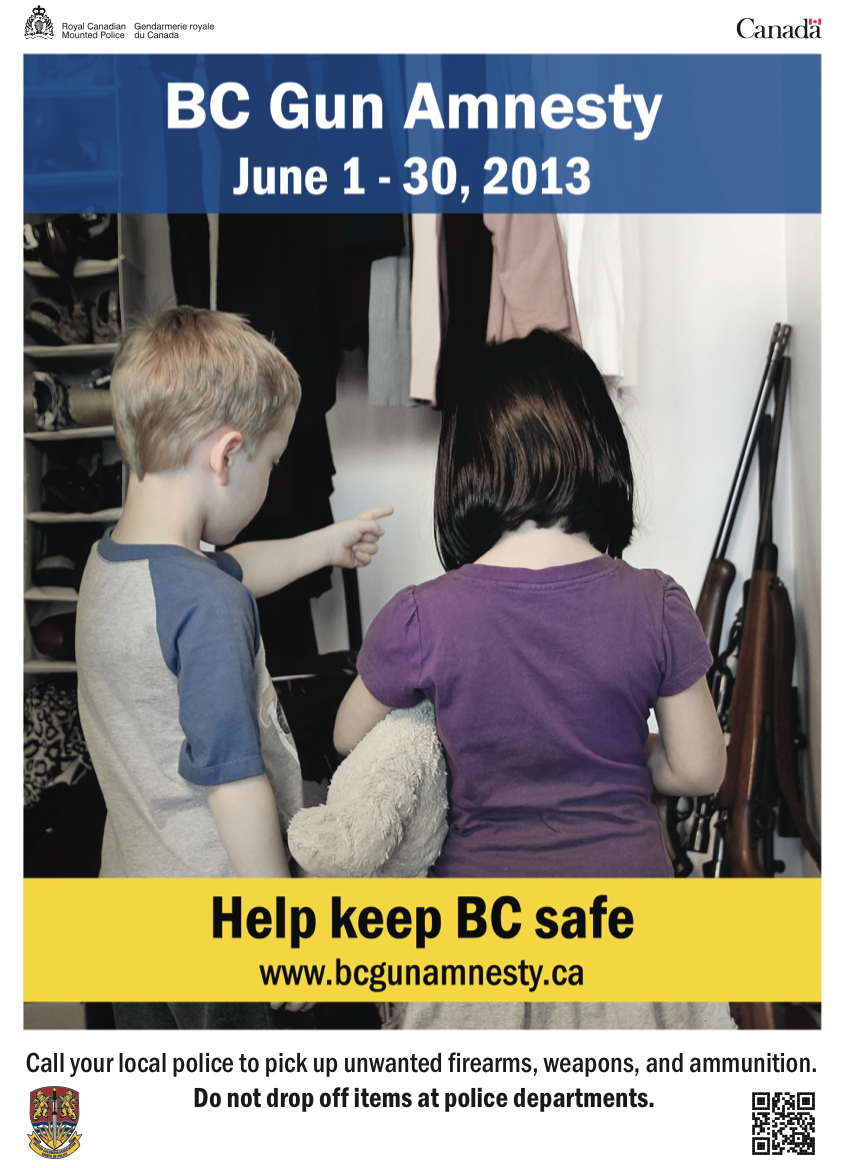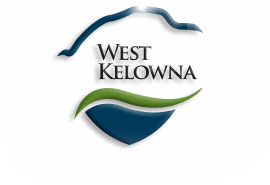FAQs on gun amnesty month

Police departments across B.C. are hoping to make homes safer by declaring a province-wide Gun Amnesty this June. The amnesty will give residents of B.C. a safe way to dispose of weapons, imitation weapons and related equipment and ammunition which they are not legally entitled to own, or which they no longer want.
The amnesty provides the opportunity to reduce the number of firearms in our communities, enhancing public and police officer safety. Unwanted weapons are a potential hazard. If they are not properly secured, they could be used by children, for example, to devastating consequences. Should these weapons be stolen in a break and enter, they could be used in the commission of a crime. The B.C. Gun Amnesty is an example of just one additional method police across B.C. are using to help keep our communities safe by removing unwanted guns.
If you have any unwanted weapons, firearms or ammunition, that you may not be legally entitled to own, now is the perfect opportunity to help make both your home and your community a little bit safer during B.C. Gun Amnesty this June.
At the 2006 Gun Amnesty, in excess of 3,200 guns were turned in to police including 505 handguns, and 725 other unwanted weapons. 96,500 rounds of ammunition, a rocket launcher, and a machine gun were also turned in.
B.C. GUN AMNESTY, JUNE 2013 – Q&As
Q – Why are the police holding this amnesty?
A – The police would like to give the public a safe way to dispose of weapons,
imitation weapons and related equipment and ammunition which they are not
legally entitled to own, or which they no longer want. The amnesty provides the
opportunity to reduce the number of firearms in our communities, enhancing
public and police officer safety.
Q – Does the RCMP expect crime guns to be turned in during this amnesty?
A – The amnesty is for B.C. residents who voluntarily surrender unwanted or illegally
owned firearms, weapons or ammunition. During the amnesty, police will not
recommend weapons-related Criminal Code charges that might otherwise apply
against people who are turning in these items. There is no amnesty for people
who turn in weapons that have been used in the commission of a crime.
Q – Do you expect this amnesty will have an impact on gang related
shootings?
A – Probably not – though there is the possibility that a gun could be stolen from a
home, and then used in the commission of another crime.
Q – What do you expect to gain from having this amnesty?
A – Unwanted weapons are a potential hazard. If they are not properly secured, they
could be used by children for example, to devastating consequences.
Additionally, should these weapons be stolen in a break and enter, they could be
used in the commission of a crime.
Q – Why are police officers wasting precious time going to people’s homes to
pick up guns that haven’t even been used in a crime?
A – The RCMP’s first priority is public safety. We reduce the probability of injury or
accidents if police handle these weapons instead of having participants bring
them into police detachments.
Q – How many guns do you think are out there?
A – Because we can’t track illegally owned firearms, I don’t have an answer to that
question.
Q – What was the process prior to the amnesty? Could people turn in
unwanted firearms before this?
A – The police decide at their discretion whether or not to recommend charges. For
example, it is unlikely police would recommend charges against a widow who
simply wanted to turn in her dead husband’s firearms collection. However, this
amnesty extends to all firearms, registered or unregistered, and individuals who
don’t have a license to possess firearms.
Q – How many guns were turned in at the last amnesty in 2006?
A – At the 2006 Gun Amnesty, in excess of 3,200 guns were turned in to police
including 505 handguns, and 725 other unwanted weapons. 96,500 rounds of
ammunition, a rocket launcher, and a machine gun were also turned in.
Q – What will happen to the guns that have been turned in?
A – The vast majority will be destroyed. A small number of firearms may be retained
for educational or training purposes.
Q – Who can participate and how?
A – Any resident of B.C. may participate in the amnesty. From June 1 to 30, they
may contact the non-emergency number of their local police to arrange a suitable
time to have an officer attend to collect the items.
Q – What types of firearms and weapons might be handed in during the
amnesty?
A – Police would like all unregistered guns to be turned in, even imitation and pellet
weapons. Other dangerous weapons such as registered firearms, pepper spray
and knives will also be accepted under the amnesty.
Q – Can ammunition also be turned in during the amnesty?
A – Yes, the police will accept all types of ammunition during this amnesty.
Q – Is this amnesty a reaction to the recent school shootings that have
happened across North America?
A – The last gun amnesty occurred in 2006, which successfully removed over 3,200
guns from communities across the province. There is a consensus amongst
police agencies in B.C. that holding another gun amnesty is needed and timely.
The B.C. Gun Amnesty is an example of just one additional method police across
B.C. are using to help keep our communities safe by removing unwanted guns.
Q – I have inherited a gun and do not want to turn it in. Where can I get
information on licensing and proper storage?
A – You can visit the RCMP’s National website for information on the Canadian
Firearms Program at www.rcmp-grc.gc.ca/cfp-pcaf. There you will find some
general safety information, as well as information on Inherited Firearms.
Join the Conversation!
Want to share your thoughts, add context, or connect with others in your community?
You must be logged in to post a comment.

















